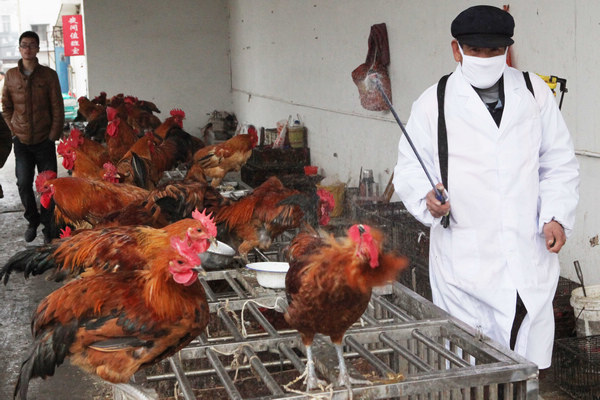18th bird-flu case recorded
Updated: 2013-04-07 08:04
By Wang Hongyi in Shanghai and Wang Qingyun in Beijing (China Daily)
|
||||||||
Sale of live poultry banned in 3 cities in East China
 |
|
A health and safety worker sprays chickens with disinfectant in the live-animal section of Xindongfang market in Ganyu county, Jiangsu province. Six people have been infected with the H7N9 bird flu virus in Jiangsu. [Photo by Si Wen/For China Daily] |
Three major cities in China have suspended trade in live poultry while the rest of the country remains on edge after 18 cases of H7N9 in humans have been reported in East China.
On Saturday, Shanghai, Nanjing and Hangzhou placed bans on the sale and trade of live poultry, city officials said. Two new cases of the bird-flu strain were reported in Shanghai, bringing the total of confirmed cases in the city to eight as of 7 pm, and the number nationwide to 18. Elsewhere, six cases were reported in Jiangsu province, three in Zhejiang and one in Anhui.
A total of six people have died, four in Shanghai and two in Zhejiang province.
Chinese health authorities said that all confirmed cases involved diseased poultry and that there has been no sign of human-to-human transmission.
On Saturday, Shanghai banned live poultry from other parts of the country from entering the city and began mass slaughter of birds after H7N9 was found in pigeon samples from a farm-product market in the city's Songjiang district.
Shanghai's largest live poultry market, Sanguantang Market, stopped operations early on Saturday. More than 160 traders have left the market, and workers from the municipal agricultural authority moved in to sterilize the area.
The Shanghai Pigeon Association canceled all pigeon races in a bid to prevent any potential spread of the virus.
Nanjing, capital of Jiangsu province, ordered the suspension of all live-poultry trade and the immediate shuttering of poultry markets.
"Sales of live poultry at the three main poultry trade markets - Zijinshan, Tianyinshan and Jianye - which account for 90 percent of all poultry in the city, have been banned," Wang Zhixi, deputy director of the Industrial and Commercial Bureau of Nanjing, told Xinhua News Agency. Shipping poultry into and out of the city was also stopped.
Health authorities in Jiangsu said on Saturday that five confirmed H7N9 patients are in serious condition and under treatment.
The 104 people who are known to have had close contact with the five H7N9 patients in Nanjing are showing no flu symptoms, such as cough, runny nose and sore throat. Sixty-four of them have already been released from medical observation, Nanjing officials said.
Hangzhou, capital of Zhejiang province, suspended trades at one poultry market after traces of H7N9 were detected in quails sold in the market.
Hangzhou health officials said the virus was detected in five out of 12 live poultry samples from this market. The virus samples have been sent to the national disease control and prevention center for further tests. Hangzhou authorities immediately began to slaughter the birds in the market at 2 am on Saturday, and suspended all trades.
Beijing officials have yet to discover any cases of the H7N9 virus in humans. The Beijing Center for Disease Control and Prevention said that it got reagents to test for the virus from China's CDC on Tuesday.
"We are able to do the test for 300 people, and more reagents are on the way," said Pang Xinghuo, vice-director of the city's center.
Right now the center is responsible for testing the virus in the city, but it may distribute testing kits to its branches in different districts and 55 laboratories that can test for transmitted diseases, if the disease continues to spread, she said. The city is not monitoring the temperatures of air passengers and other travelers since there has not been a case reported in the capital, but all medical institutions must report any suspected case of H7N9 infection, she told the Beijing Times.
International reaction to the outbreak has been cautious. Singapore's health ministry issued an advisory for travelers returning from China's bird flu-hit areas on Saturday. The ministry advised travelers to be vigilant for symptoms of the disease but fell short of advising travelers against visiting the affected provinces.
The outbreak is still at an early stage and has not appeared in any concentrations, but the National Health and Family Planning commission said it is instructing regions to disclose new cases promptly, track people in close contact with infected people, and treat confirmed cases expediently, as national leaders have demanded.
Xinhua contributed to this story.
Contact the writers atwanghongyi@chinadaily.com.cn andwangqingyun@chinadaily.com.cn.
- China approves anti-flu drug with H7N9 potential
- Shanghai reports two more H7N9 cases
- Hangzhou suspends live poultry trade due to H7N9
- China's confirmed H7N9 cases isolated: authorities
- UN praises China's quick notification of H7N9
- More samples tested H7N9 positive in Shanghai
- Sixth death from H7N9 bird flu reported

 Li Na on Time cover, makes influential 100 list
Li Na on Time cover, makes influential 100 list
 FBI releases photos of 2 Boston bombings suspects
FBI releases photos of 2 Boston bombings suspects
 World's wackiest hairstyles
World's wackiest hairstyles
 Sandstorms strike Northwest China
Sandstorms strike Northwest China
 Never-seen photos of Madonna on display
Never-seen photos of Madonna on display
 H7N9 outbreak linked to waterfowl migration
H7N9 outbreak linked to waterfowl migration
 Dozens feared dead in Texas plant blast
Dozens feared dead in Texas plant blast
 Venezuelan court rules out manual votes counting
Venezuelan court rules out manual votes counting
Most Viewed
Editor's Picks

|

|

|

|

|

|
Today's Top News
Boston bombing suspect reported cornered on boat
7.0-magnitude quake hits Sichuan
Cross-talk artist helps to spread the word
'Green' awareness levels drop in Beijing
Palace Museum spruces up
First couple on Time's list of most influential
H7N9 flu transmission studied
Trading channels 'need to broaden'
US Weekly

|

|







